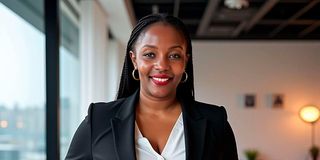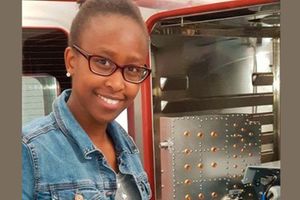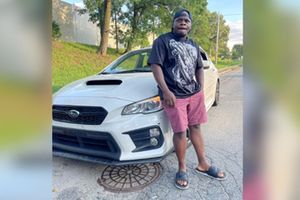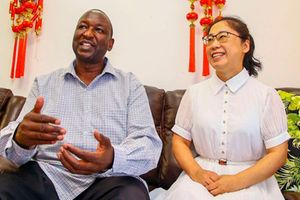
Catherine Wangui is a nurse in the Pacific North’s US Washington State
Her career’s Damascus moment happened when she turned 40. Catherine Wangui, now a nurse in the Pacific North’s US Washington State had worked in Kenya as a sales representative for two top Kenyan banks rising to the position of sales manager.
She moved to the insurance industry before the sad but primal revelation that she was not making any progress economically dawned on her. She was at wits end with a stagnant career and broken marriage.
“It never occurred to me that I could travel outside the country because maybe of the environment that I grew up in that didn't have people who had travelled outside the country to let me know that there exist other opportunities outside Kirinyaga, where I grew up, and maybe Kenya. I didn't even think about it because I had children I was raising. My life was busy raising them until things became so bad that I started looking for opportunities outside the country,” she tells Nation Lifestyle.
In 2018, she decided to relocate to the US.

Catherine Wangui is a nurse in the Pacific North’s US Washington State
“As a mother of two daughters, one who had just become an adult, I wanted to afford them a better life than I had growing up, a better education, and a better shot at the future. I knew relocation would be a big sacrifice. Leaving my family and friends back at home, long-distance parenting with an indefinite plan of resettling back in Kenya was going to be difficult. But remaining stagnant was not a solution either, so we discussed it with those close to me and had an understanding. My family raised money for my air ticket to the US,” she says.
When Catherine landed in Washington State in June 2018, she didn’t have a proper roadmap of what she wanted to do with her life. She lived with a host for three months before moving to another household as a caregiver for six months. She gleaned great amounts of influence in her American dream from the people she interacted with in her early relocation days.
“Many immigrants will tell you that the person who receives you in the country holds significant sway in whatever path you decide to follow. Upon my arrival here, I worked and lived with entrepreneurs who employed me. They, too, like me, are immigrants but from Ethiopia. Looking around, some of them were in the health sector. Therefore, healthcare became an easy choice for me since it was what I was constantly exposed to,” she says.
She gave other industries like banking a thought too, if for nothing else, for the fact that banking and sales are what she had the requisite skillset for.
“I did my research about banking in the US as well, looked into how much US bankers are paid. I decided I didn't want to become a banker here,” she says.
Catherine drew a list of considerations with every option she looked into. One central theme that kept recurring was the need to go back to school to upskill and improve her employability chances.
“I looked at the careers, the options that were there in terms of the time I'll be in school, and the funding needed for the school and put this side-by-side with the obligation to provide back at home,” she says.
The other theme that kept surfacing was sustainability.
“Being a caregiver was not sustainable for me. I didn't see myself having holidays, having the well-balanced life I desired, without having to work double shifts all the time as a caregiver.”
Licensed practising nurse
Catherine admits that she’d been mentored properly by her host.
“They encouraged me to save money now that I didn’t have bills like rent and get back to school. One of them worked at a children’s hospital, and through them, I left caregiving to work at a hospital as a certified nursing assistant,” she says.
The path to becoming a licensed practising nurse was made clear at this point in her life.
“The search for a nursing school started with me asking myself—just like I had before—very important questions. What school can I go to that offers what I want for a shorter period than is the norm? What are the cost implications, and how am I going to survive as a student in a main school? These questions would be the ones tilting the balance I was looking for.”
She worked at the hospital for one and a half years.
“I applied for scholarships, but many didn’t go through. I only got a sponsorship for one semester from the hospital I was working in. The college I found was in Oregon. The hospital's scholarships are ‘domestic’ in practice.”
She moved to Oregon to study at the Sumner College in November 2021. She planned to finance her education via loans.
“Unfortunately, I didn’t get in because there was no one to guarantee me. Through sharing my experience, I got a caring job that I did on weekends. I used to be paid around $2,000 (Sh258,840) per month. This means I had to make certain financial adjustments. I scaled down from living in an apartment to finding affordable accommodation in Oregon. I worked on weekends when I was not going to school.”
After college in 2023, she remained in Oregon for some time to gain experience as a nurse.
“While figuring out my next move, I felt like going to nursing school had not changed my life as I had expected. It didn't meet my expectations (in terms of working fewer hours, having more time for myself, having more time to do things that I love like playing golf, gardening, or even reading a book without having to work so much and get the money I had hoped I would be getting).
"It started running in my mind, paving the way for that uncomfortable question again. What do I do? Do I go back to school and do an RN [registered nurse] or a BSN [Bachelor of Science in Nursing] course? Around the same time, many Kenyans had moved from the East Coast, and they had businesses here in Oregon for group homes [Group homes are supervised residential homes that provide assisted living and medical care for people living with disabilities, mental health conditions, or developmental delays].
"I started inquiring about how they were doing the business of group homes. I looked further into different states to study their practice and business aspects. Not long after, I visited Spokane County in Washington State for a golf tournament. I went for a couple of dinners with Kenyans, specifically those in a group home business. I started making plans to relocate from Oregon to Washington. I had to change my license from Oregon to Washington, set aside money for moving logistics, and look for a job that would keep me afloat before I executed my plan for a fruitful beginning.”
She got a job at the Western State Hospital.
“I got a very good job as a civil servant by any standards, but that is not why I went back to Washington; I came back here to start a business and buy a home,” she says.
Business owner abroad
In August 2024, she bought the home she so much wanted.
“I have spent the last six months remodeling it into a group home, acquiring the required licenses, and doing all the paperwork. Once this is done, I will start what I never thought would have been my dream—a business owner in a foreign country,” Catherine says.
“Essentially, I live with them [the adults who can’t take care of themselves] in the home as a medical practitioner. I administer medical care and also offer any other care they need while there,” she says.
Charges vary with the level of care needed and the kind of patient.
There are two kinds: MedicAid (government-sponsored and private clients). The government is the biggest contractor, and it pays $3,000 [Sh388,212] per patient. Private clients can pay between $15,000 to $20,000 (Sh1.9 million to Sh2.6 million) per month.
Her business has yet to start receiving patients, but she is optimistic because there is a growing need; the hospital she works in receives them in hundreds.
Catherine’s journey has had many wins.
“If you told me, at 40, I would change my life, I wouldn’t have believed you. I am here [in the US] with one of my daughters, who recently graduated. Not only am I on the verge of owning a business, but my family is coming back together as well. My most important lesson in this whole journey is that the reset button is not determined by age. You can reset and restart at whatever age. I was in nursing school with people half my age, but here we are,” she tells Lifestyle.








